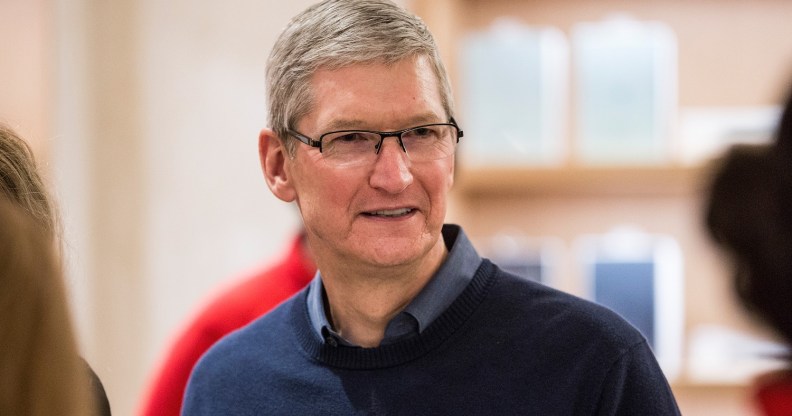Apple CEO’s gay rights activism ‘helps boost iPhone sales’

A study has revealed that Apple CEO Tim Cook’s interventions on gay rights help to boost interest in the tech giant’s products.
Mr Cook, who succeeded Steve Jobs at the head of the Cupertino firm, came out as gay in an op-ed in 2014.
He has subsequently spoken out on LGBT rights a number of times – condemning anti-gay legislation in his native Indiana, as well as lending the firm’s weight to an employers’ brief in the Supreme Court equal marriage case.
Most recently, Apple was among companies to endorse the proposed US Equality Act – Us-wide Democratic legislation that would outlaw anti-LGBT discrimination in all 50 states.

This week, a study has found that so-called activist CEOs such as Cook are actually helping to drive up business for their brands by speaking out on issues.
Professors Aaron Chatterji of Duke University and Michael Toffel of Harvard Business School looked into the stances taken by Cook and other ‘activist’ CEOs – such as Starbucks CEO Howard Schultz, who has prioritised race relations.
Chatterji explained to the Washington Post: “These CEOs are intentionally courting controversy by weighing in on contentious issues without any obvious pretense of raising profits.
“What we think makes this new is that many CEOs are now speaking out on controversial issues largely unrelated to the bottom line.
“If you’re a businessperson, why would you want to alienate a large percentage of your customers?”
In an experiment, they found that a CEO’s stance could be influential on a topic – but more importantly, actually boosted the likelihood that consumers would commit to their products. People who were told of Mr Cook’s record on LGBT rights were more likely to conclude that they would buy Apple products in the near future.
The researchers explain: “We find that Cook’s contention that the religious freedom law legalizes discrimination against gays positively influenced consumers’ intent to purchase Apple products, particularly among people who supported same-sex marriage.
“This finding implies that when CEOs take public stands on controversial issues, they can galvanize support for their company from those who share the same viewpoint.”
“In this manner, CEO activism’s primary effect is through signaling which side of a public debate CEOs and, by implication, their companies are on.
They added: “At the same time, CEO activism risks alienating consumers who disagree with the CEO’s public stance.
“In our case, the increase in purchasing intent for Apple products among respondents strongly supportive of same-sex marriage occurs with no commensurate decline among those opposed to same-sex marriage.
“However, the benefits and costs of CEO activism will likely vary with the issue, with the nature of the corporate leader’s involvement, and with the elasticity of demand for the company’s products.”
However, the study did not appear to take into account the ramifications in the global market – and the potentially damaging impact on sales in countries where LGBT people are vilified.
Of the influence CEOs can have, they added: “These results suggest that there is considerable power in how political or social issues are framed and that corporate leaders— whose CEO activism often attracts media attention—can use this power to their advantage when advocating in the public domain.”

